https://sputnikglobe.com/20230222/how-russo-chinese-strategic-cooperation-may-bring-us-forever-wars-to-end-1107713826.html
How Russo-Chinese Strategic Cooperation May Bring US Forever Wars to End
How Russo-Chinese Strategic Cooperation May Bring US Forever Wars to End
Sputnik International
China has many reasons to deepen ties with Russia amid the surge in US provocations against the two powers, international observers told Sputnik, expressing doubts about Washington's capability of waging a hot war simultaneously against Moscow and Beijing.
2023-02-22T17:29+0000
2023-02-22T17:29+0000
2023-06-19T12:46+0000
analysis
us
opinion
china
russia
ukraine
europe
wang yi
munich security conference
sergey lavrov
https://cdn1.img.sputnikglobe.com/img/105803/83/1058038381_0:0:2842:1598_1920x0_80_0_0_bd34b092ea7a2865f10d92b6b8e6212a.jpg
"In recent years, Chinese-Russian relations have been developing steadily, and have now entered a new stage of comprehensive cooperation and strategic partnership," Yang Mian, an international relations professor at the Communication University of China in Beijing, told Sputnik. "China and Russia have always adhered to the development of bilateral relations based on the principles of non-alignment, non-confrontation and non-targeting of third parties."The professor pointed out that the US is forming groups of its supporters in order to force China to change its position with regard to the Ukraine conflict. For its part, Beijing is not inclined to choose sides, but calls for a peace settlement and promotes negotiations, according to Yang.'Russo-China Relations are Solid as Rock'Russian and Chinese top-level officials recently confirmed their strong commitment to enhancing collaboration between the two countries. On February 22, Director of the Office of the Central Foreign Affairs Commission Wang Yi held meetings with Russian President Vladimir Putin and Foreign Minister Sergey Larov. Wang highlighted that Beijing is ready "to deepen political mutual trust and strategic cooperation with the Russian side, comprehensively expand practical cooperation (...) to ensure the interests of our countries, as well as to promote the development of the whole world."While speaking to Nikolai Patrushev, the head of Russia's Security Council, the Chinese official stated that relations between the nations are "solid as a rock" and will withstand any test."Wang Yi used images of the strength of Russian-Chinese ties while still being foreign minister in 2021. Having become a high-ranking official of the CPC Central Committee system in charge of foreign policy, he reaffirmed that Russian-Chinese bilateral ties are indeed strong and stable, unaffected by external changes," the academic continued.China's Global Security Initiative ConceptBut that is not all: prior to visiting Moscow, Wang delivered a speech titled "Making the World a Safer Place" at the Munich Security Conference. The Chinese official stressed that all people are members of "one global village" and belong to a community with a shared future, warning the international community against falling into the trap of zero-sum game, antagonism, division, and confrontation.Wang also announced the release of China's Global Security Initiative Concept Paper, which lays out practical measures to address current security challenges. The document particularly states that "the Cold War mentality, unilateralism, bloc confrontation and hegemonism contradict the spirit of the UN Charter and must be resisted and rejected."The release of the Global Security Initiative Concept coincided with Vladimir Putin's address to the Federal Assembly, in which the Russian president lambasted the collective West for methodically violating the principle of common and indivisible security, abusing other countries' sovereignty and neglecting the security concerns of other states.Beijing's Global Security Initiative deserves very careful consideration, Lomanov underscored. According to him, Wang's statement that China and Russia need to take new steps on the path of strategic cooperation is a signal that Beijing considers Russia as a key and indispensable partner in the implementation of the new initiative.Ukraine Scenario for TaiwanMeanwhile, Beijing is closely monitoring the Biden administration's provocative statements targeting the People's Republic. Mara Karlin, the US assistant secretary of defense for strategy, plans, and capabilities, recently told the Senate that Ukraine would be a model for Taiwan defense if Beijing attacks the island's "sovereignty." Beijing considers the island an inalienable part of China.Karlin's remarks came as US-Chinese relations remain at historic lows. Previously, the Biden administration cancelled Secretary of State Antony Blinken's visit to the People's Republic over the so-called Chinese "spy" balloon scandal. The US military shot down the Chinese airship which, according to Beijing, was nothing but a meteorological device. During the next few days, the US military downed several other unidentified flying objects hovering in American airspace in what the Chinese qualified as "hysteria."The latest Taiwan statement by Karlin is tricky, especially because ordinary Taiwanese do not want to fight in a hypothetical US-China war over the island, according to Thomas W. Pauken II, the author of "US vs China: From Trade War to Reciprocal Deal," a consultant on Asia-Pacific affairs, and a geopolitical commentator.Pauken noted that if Washington war planners deem that they can arm the Taiwanese and send them to fight against the Chinese, it means they are getting the regional situation wrong. So, when US officials evoke the Ukraine scenario, in which Ukrainian troops are being used as cannon fodder, it hits a raw nerve with Taiwanese leaders and Asia-Pacific countries, according to the consultant. "They don't know if the US is going to show up and fight, fight for Taiwan [in the event of a conflict] or are they just going to send them weapons, and it will be a case of too little, too late," he remarked.US Cannot Fight Hot War Against Russia and ChinaOne might ask whether the US is really ready to show up in the Asia-Pacific in the event of war. Pauken is skeptical about the Biden administration's readiness to directly confront China in the near term, especially given that Washington is burning through its weapons in the flames of the Ukraine conflict."Many Americans love playing video games and sometimes they think foreign policy is a video game," Pauken said. "So, they talk about fighting Russia and China at the same time, but if that was true, then why is the US not directly fighting Russia at this moment? They're just sending weapons. So if the US is so strong and able to handle a two-pronged war between Russia and China, don't you think they would have defeated Russia first before going after China? They don't even send the US troops into Ukraine. What are we supposed to expect if something happens in Asia-Pacific?"Pauken suggested that, apparently, Biden administration strategists thought they would drag Russia into an Afghanistan-style scenario in Ukraine and make it bogged down in the conflict. In that case, perhaps, Washington would have had more room for maneuver, but the plan did not work, according to the author.Earlier, the Western mainstream press lamented the fact that the Ukraine conflict is depleting NATO member states' arsenals. At the same time, Western media yarns about Russia running out of missiles and shells turned out to be hot air. To complicate matters further for the Biden administration, NATO's Ukraine policy has driven Russia and China closer together.While Biden visits Kiev, pledges indefinite support to Ukraine, and holds, together with NATO Secretary General Jens Stoltenberg, a summit of the bloc's easternmost members in Warsaw, the writing is already on the wall, and it says that the White House's resources for maintaining the Ukraine conflict are waning. This sentiment has already been voiced by Biden administration officials and leaked to the mainstream press. Apparently, Beijing's Global Security Initiative Concept has come just in time to lay the ground for future peace talks.
https://sputnikglobe.com/20230222/russian-president-putin-meets-chinas-top-diplomat-wang-yi-1107695314.html
https://sputnikglobe.com/20230222/russian-fm-lavrov-meets-chinas-top-diplomat-wang-yi-in-moscow-1107692842.html
https://sputnikglobe.com/20230221/putins-speech-from-russias-economic-growth--military-advancements-to-new-start-suspension-1107672755.html
https://sputnikglobe.com/20230221/beijing-urges-foreign-nations-to-cease-ukraine-today-taiwan-tomorrow-statements-1107646304.html
https://sputnikglobe.com/20230222/joint-drills-with-russia--china-sign-of-south-africas-independence-experts-say-1107650663.html
https://sputnikglobe.com/20230217/time-for-peace-talks-biden-facing-faded-public-support-for-arming-ukraine-1107554952.html
china
russia
ukraine
taiwan
Sputnik International
feedback@sputniknews.com
+74956456601
MIA „Rossiya Segodnya“
2023
News
en_EN
Sputnik International
feedback@sputniknews.com
+74956456601
MIA „Rossiya Segodnya“
Sputnik International
feedback@sputniknews.com
+74956456601
MIA „Rossiya Segodnya“
china-russia relations, china's global security initiative, wang yi's visit to moscow, deepening strategic alliance between russia and china, putin's address to federal assembly, peace talks over ukraine, indivisive shared security, global security, nuclear powers, us provocations over taiwan, us forever wars, us military aid to kiev, biden trip to poland
china-russia relations, china's global security initiative, wang yi's visit to moscow, deepening strategic alliance between russia and china, putin's address to federal assembly, peace talks over ukraine, indivisive shared security, global security, nuclear powers, us provocations over taiwan, us forever wars, us military aid to kiev, biden trip to poland
How Russo-Chinese Strategic Cooperation May Bring US Forever Wars to End
17:29 GMT 22.02.2023 (Updated: 12:46 GMT 19.06.2023) China has many reasons to deepen ties with Russia amid the surge in US provocations against the two powers, international observers told Sputnik, expressing doubts about Washington's capability of waging a hot war simultaneously against Moscow and Beijing.
"In recent years, Chinese-Russian relations have been developing steadily, and have now entered a new stage of comprehensive cooperation and strategic partnership," Yang Mian, an international relations professor at the Communication University of China in Beijing, told Sputnik. "China and Russia have always adhered to the development of bilateral relations based on the principles of non-alignment, non-confrontation and non-targeting of third parties."
"As independent powers of influence, China and Russia stand for the maintenance of international peace and security, as well as for the independence and sovereignty of all countries in the world. Maintenance of stable and friendly relations between [Beijing and Moscow] contributes to the long-term development of the two countries and the whole world. This is especially true in the current difficult situation in the world and the ongoing conflict between Russia and Ukraine," Yang continued.
The professor pointed out that the US is forming groups of its supporters in order to force China to change its position with regard to the Ukraine conflict. For its part, Beijing is not inclined to choose sides, but calls for a peace settlement and promotes negotiations, according to Yang.
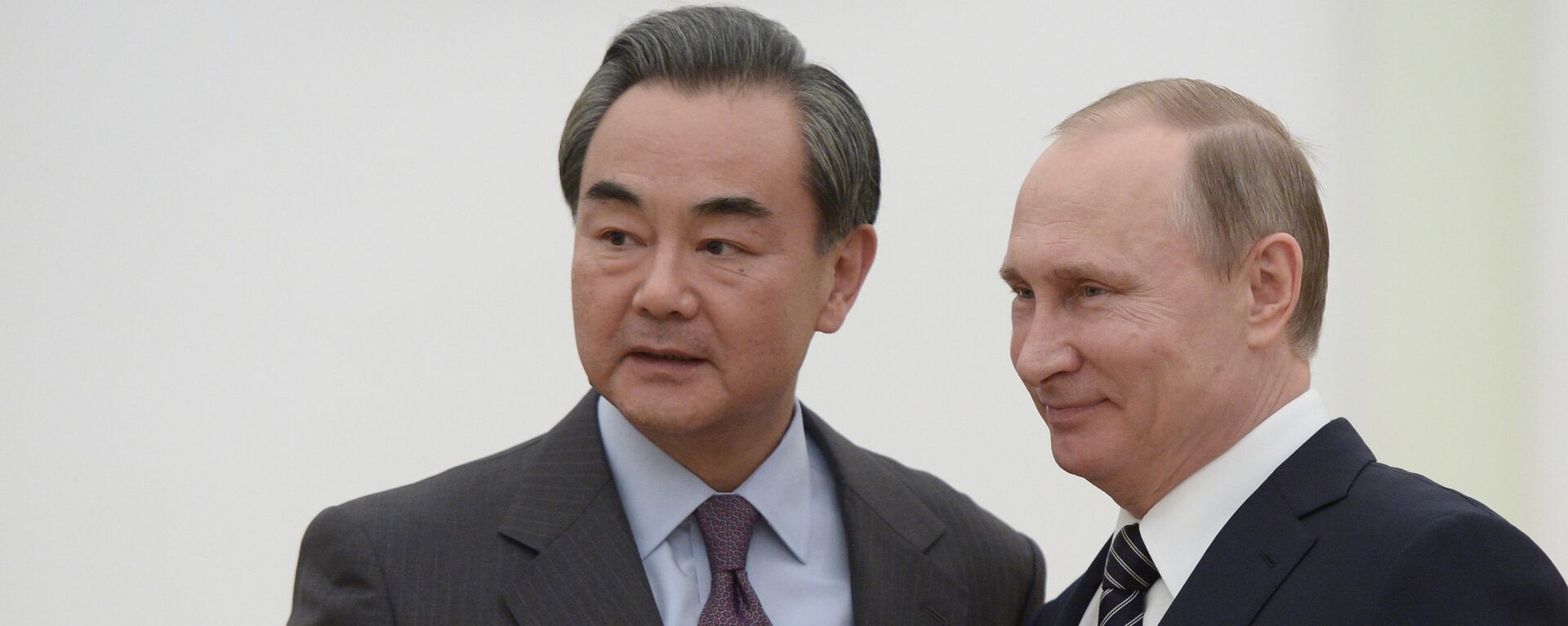
22 February 2023, 11:04 GMT
'Russo-China Relations are Solid as Rock'
Russian and Chinese top-level officials recently confirmed their strong commitment to enhancing collaboration between the two countries. On February 22, Director of the Office of the Central Foreign Affairs Commission Wang Yi held meetings with Russian President Vladimir Putin and Foreign Minister Sergey Larov. Wang highlighted that Beijing is ready "to deepen political mutual trust and strategic cooperation with the Russian side, comprehensively expand practical cooperation (...) to ensure the interests of our countries, as well as to promote the development of the whole world."
While speaking to Nikolai Patrushev, the head of Russia's Security Council, the Chinese official stated that relations between the nations are "solid as a rock" and will withstand any test.
"Wang Yi's statement is a very interesting and positive signal that Chinese foreign policy towards Russia is stable not only in its content, but even in its conceptual language," Alexander Lomanov, professor and chief researcher at the Primakov Institute of World Economy and International Relations (IMEMO), the Russian Academy of Sciences, told Sputnik.
"Wang Yi used images of the strength of Russian-Chinese ties while still being foreign minister in 2021. Having become a high-ranking official of the CPC Central Committee system in charge of foreign policy, he reaffirmed that Russian-Chinese bilateral ties are indeed strong and stable, unaffected by external changes," the academic continued.
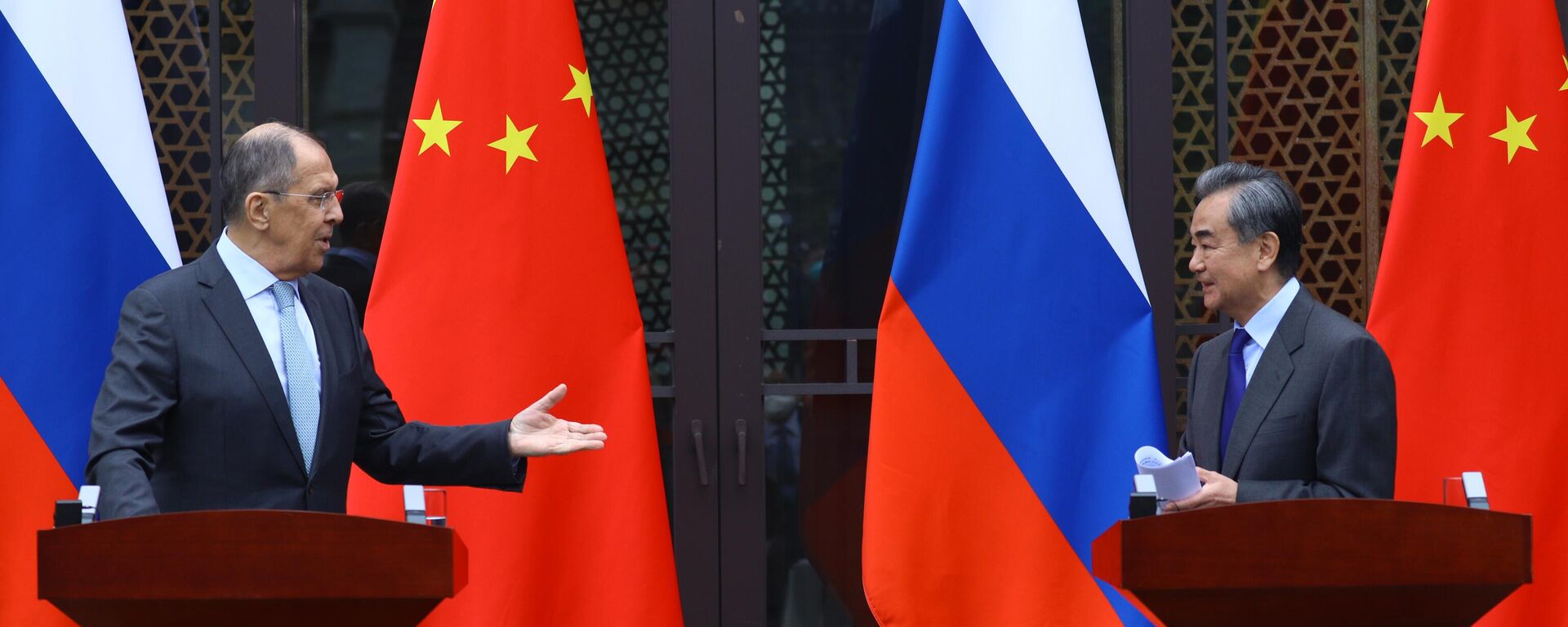
22 February 2023, 08:50 GMT
China's Global Security Initiative Concept
But that is not all: prior to visiting Moscow, Wang delivered a speech titled "Making the World a Safer Place" at the Munich Security Conference. The Chinese official stressed that all people are members of "one global village" and belong to a community with a shared future, warning the international community against falling into the trap of zero-sum game, antagonism, division, and confrontation.
Wang also announced the release of China's Global Security Initiative Concept Paper, which lays out practical measures to address current security challenges. The document particularly states that "the Cold War mentality, unilateralism, bloc confrontation and hegemonism contradict the spirit of the UN Charter and must be resisted and rejected."
"Security of one country should not come at the expense of that of others," the document further reads. "We believe all countries are equal in terms of security interests. The legitimate and reasonable security concerns of all countries should be taken seriously and addressed properly, not persistently ignored or systemically challenged."
The release of the Global Security Initiative Concept coincided with Vladimir Putin's address to the Federal Assembly, in which the Russian president lambasted the collective West for methodically violating the principle of common and indivisible security, abusing other countries' sovereignty and neglecting the security concerns of other states.
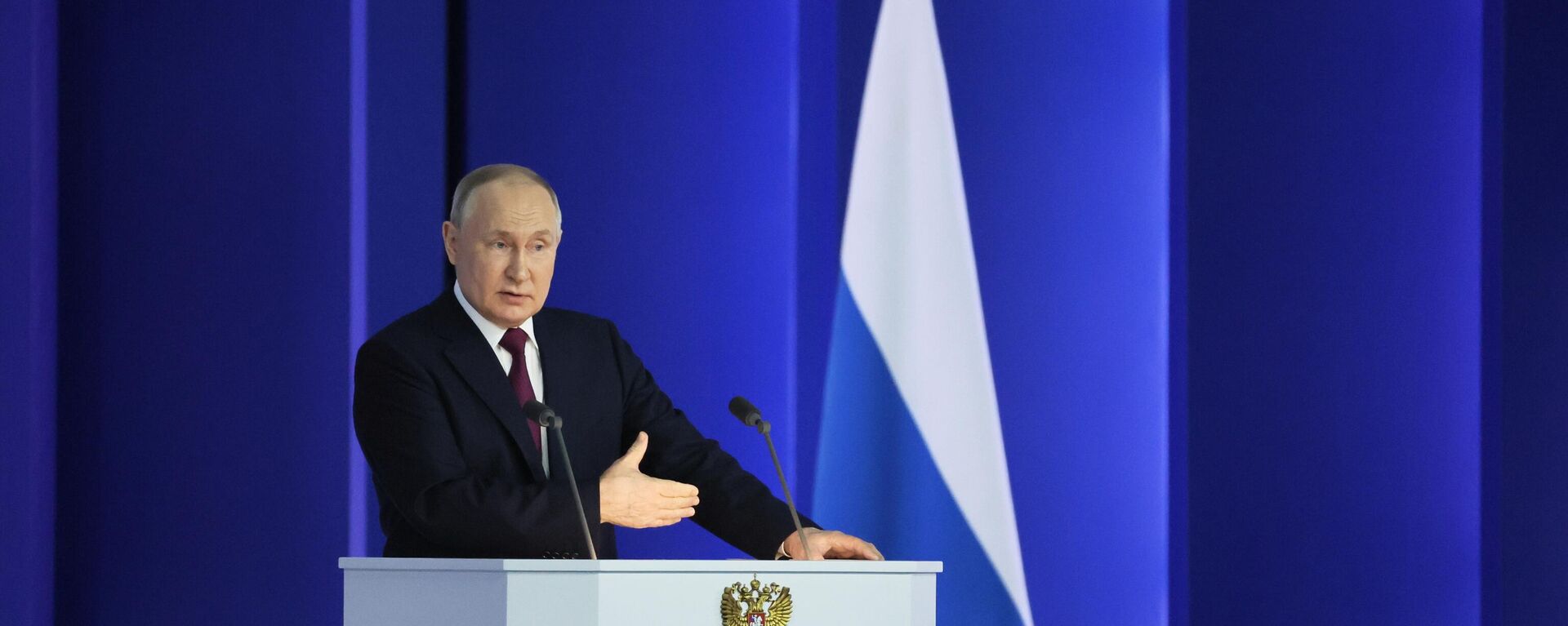
21 February 2023, 17:29 GMT
Beijing's Global Security Initiative deserves very careful consideration, Lomanov underscored. According to him, Wang's statement that China and Russia need to take new steps on the path of strategic cooperation is a signal that Beijing considers Russia as a key and indispensable partner in the implementation of the new initiative.
"Nuclear powers of the West, namely the United States, Great Britain, France, cannot become constructive partners of Beijing in promoting its Global Security Initiative due to the high degree of tension in their relations with China and due to their policy of deterrence against [the People's Republic]," said Lomanov. "China can push ahead with the implementation of this concept alone due to its influence, but if it wants to gain a strategic perspective and the ability to influence global security, it obviously needs support from Russia. Under these conditions, Russia appears to be China's key partner. Together with [Russia], China can discuss this initiative and look for ways to implement it."
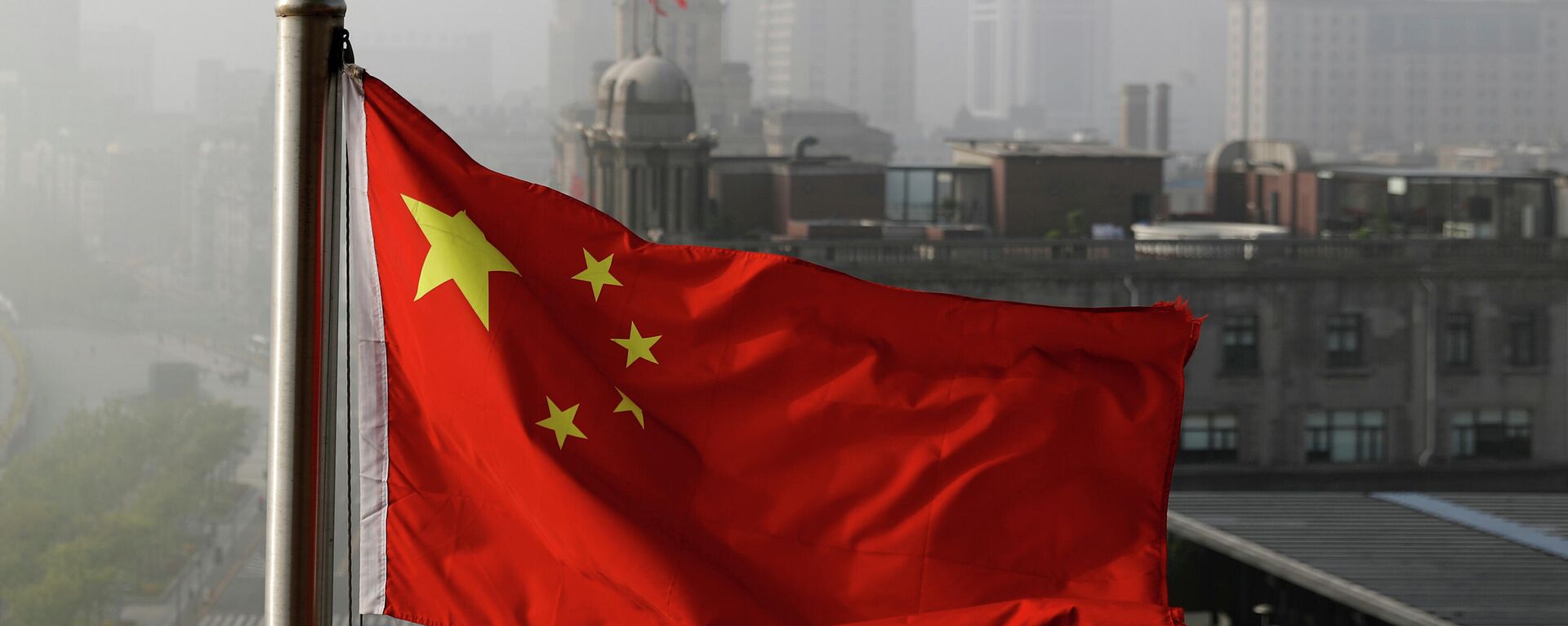
21 February 2023, 05:18 GMT
Ukraine Scenario for Taiwan
Meanwhile, Beijing is closely monitoring the Biden administration's provocative statements targeting the People's Republic. Mara Karlin, the US assistant secretary of defense for strategy, plans, and capabilities, recently told the Senate that Ukraine would be a model for Taiwan defense if Beijing attacks the island's "sovereignty." Beijing considers the island an inalienable part of China.
Karlin's remarks came as US-Chinese relations remain at historic lows. Previously, the Biden administration cancelled Secretary of State Antony Blinken's visit to the People's Republic over the so-called Chinese "spy" balloon scandal. The US military shot down the Chinese airship which, according to Beijing,
was nothing but a meteorological device. During the next few days, the US military downed several other unidentified flying objects hovering in American airspace in what the Chinese qualified as "hysteria."
The latest Taiwan statement by Karlin is tricky, especially because ordinary Taiwanese do not want to fight in a hypothetical US-China war over the island, according to Thomas W. Pauken II, the author of "US vs China: From Trade War to Reciprocal Deal," a consultant on Asia-Pacific affairs, and a geopolitical commentator.
"The problem with Taiwan I think, too often, is that the US just thinks that they can use Taiwan and that many people in Taiwan support the US, and that they want some type of conflict," Pauken told Sputnik. "That is their understanding. I have a friend who's now living in Taiwan, and he had told me that most people he talks to, who are ordinary people from Taiwan, are not interested in any type of conflict, whether it be in relation to China or the US. They would prefer to be just left alone in peace and they realize that they're just sort of being used as pawns in a super power match between China and the US."
Pauken noted that if Washington war planners deem that they can arm the Taiwanese and send them to fight against the Chinese, it means they are getting the regional situation wrong. So, when US officials evoke the Ukraine scenario, in which Ukrainian troops are being used as cannon fodder, it hits a raw nerve with Taiwanese leaders and Asia-Pacific countries, according to the consultant. "They don't know if the US is going to show up and fight, fight for Taiwan [in the event of a conflict] or are they just going to send them weapons, and it will be a case of too little, too late," he remarked.
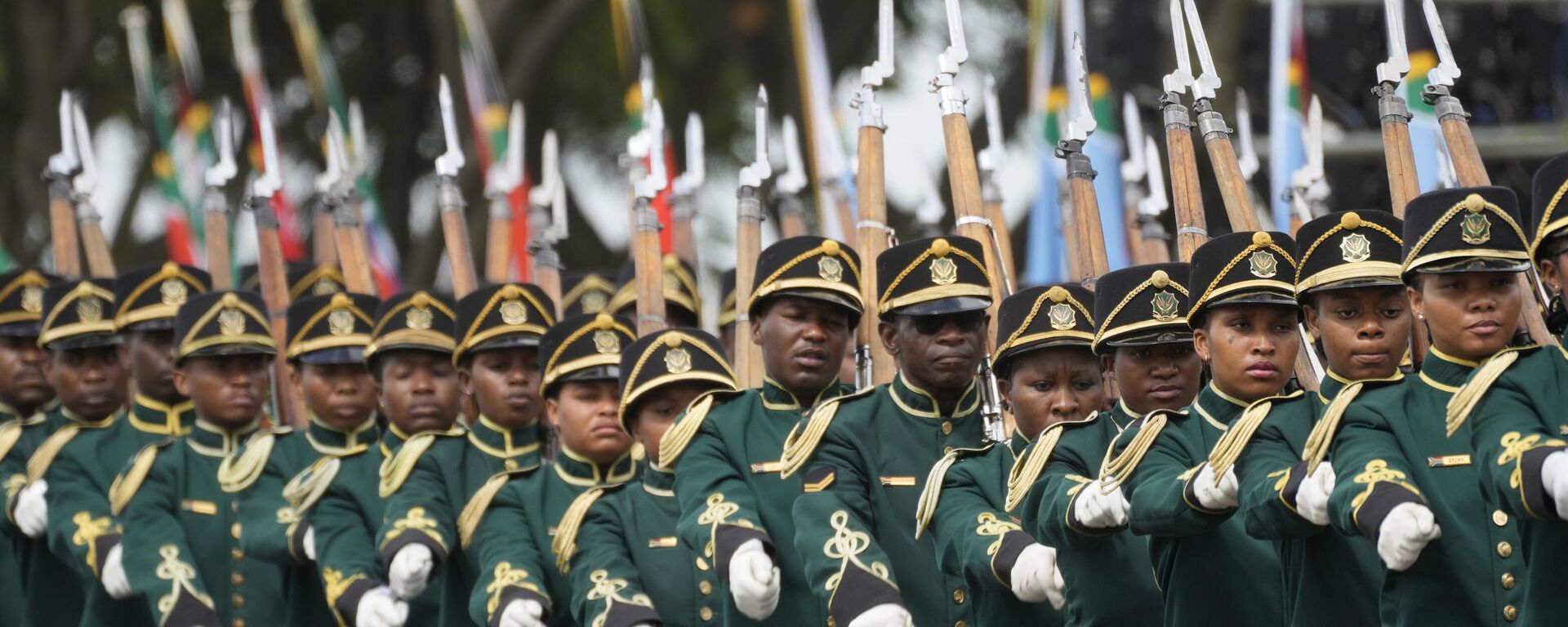
22 February 2023, 03:26 GMT
US Cannot Fight Hot War Against Russia and China
One might ask whether the US is really ready to show up in the Asia-Pacific in the event of war. Pauken is skeptical about the Biden administration's readiness to directly confront China in the near term, especially given that Washington is burning through its weapons in the flames of the Ukraine conflict.
"Many Americans love playing video games and sometimes they think foreign policy is a video game," Pauken said. "So, they talk about fighting Russia and China at the same time, but if that was true, then why is the US not directly fighting Russia at this moment? They're just sending weapons. So if the US is so strong and able to handle a two-pronged war between Russia and China, don't you think they would have defeated Russia first before going after China? They don't even send the US troops into Ukraine. What are we supposed to expect if something happens in Asia-Pacific?"
Pauken suggested that, apparently, Biden administration strategists thought they would drag Russia into an Afghanistan-style scenario in Ukraine and make it bogged down in the conflict. In that case, perhaps, Washington would have had more room for maneuver, but the plan did not work, according to the author.
"[I]t looks like what really is happening is there's this Afghanistan kind of scenario that is in reverse," the Asia-Pacific commentator said. "So, you have Russia fighting and continuing fighting. You have the Western nations continuing to send weapons as if they have an unlimited supply of weapons. And what may eventually happen is the West could be running out of weapons if this turns into a long and protracted war for many years to come. What I see is Russia could end up winning just by not losing and keep fighting for years. Because what ends up happening is NATO, the US, the UK end up running out of weapons to send to Ukraine."
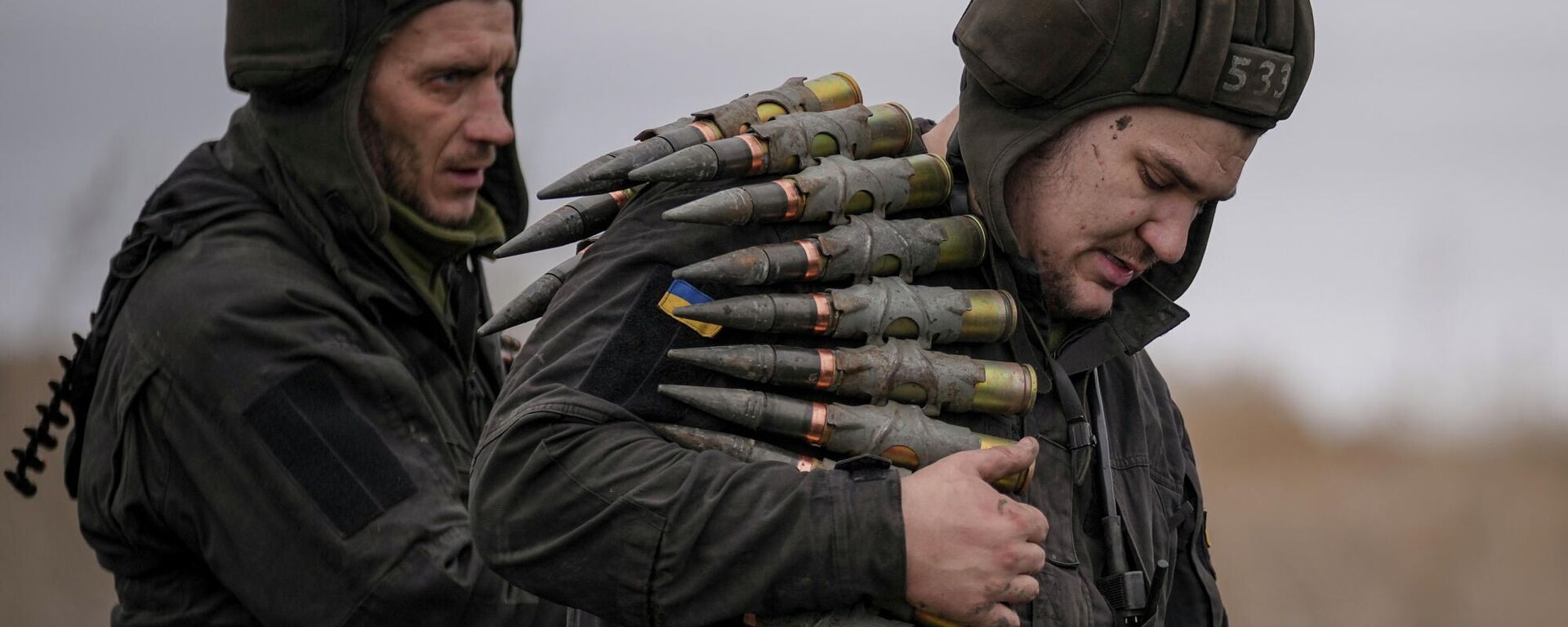
17 February 2023, 18:22 GMT
Earlier, the Western mainstream press lamented the fact that
the Ukraine conflict is depleting NATO member states' arsenals. At the same time, Western media yarns about Russia running out of missiles and shells turned out to be hot air. To complicate matters further for the Biden administration, NATO's Ukraine policy has driven Russia and China closer together.
While Biden visits Kiev, pledges indefinite support to Ukraine, and holds, together with NATO Secretary General Jens Stoltenberg, a summit of the bloc's easternmost members in Warsaw,
the writing is already on the wall, and it says that the White House's resources for maintaining the Ukraine conflict are waning. This sentiment has already been voiced by
Biden administration officials and leaked to the mainstream press. Apparently, Beijing's Global Security Initiative Concept has come just in time to lay the ground for future peace talks.








